I have a lot to finish writing up by way of case law – a post underway on narrowboats, the Canal & River Authority and Article 8, and two new court of appeal cases popped up today on Introductory tenancy notices and not occupying as principle residence, to add to the list.
But, those take time I haven’t had. And then, what has exercised/exasperated me over the last couple of days is something that I hope to be able to deal with briefly. That being fee charging McKenzie friends, law students and University law schools.
Via Prof Richard Moorhead on twitter, I came across ‘McKenzie Marketplace’. Initial suspicion as to their site’s claim to be ‘supported by BPP University Law School’, turned into outright astonishment when this BPP blog post confirmed it was so (and apparently also University of Westminster). Indeed, people confirmed that there was a banner poster for ‘McKenzie Marketplace’ up at the Holborn campus of BPP yesterday.
Now, we should be clear what McKenzie Marketplace is. It has been set up by ‘managing director’ Fraser Matcham – a law student at Uni of Westminster and ‘Entrepeneur’. The business is:
- Matching fee charging McKenzie friends to clients (including law students as McKenzies)
- This is wholly unsupervised activity.
- Taking a 10-15% cut of the fees.
- Law students charged out at £25 per hour, others (with no qualification at all necessarily) at £90 per hour
- Fess paid via MM’s account – so holding client money
- All communications to be through MM’s communication system (Ostensibly for data protection, but obviously to prevent any private deals). We’ll come back to data protection in a minute.
- All McKenzie friends signing up to MM have to have ‘professional indemnity insurance’. It appears, though this is less than clear, that this must be with insurers arranged by MM. It is also far from clear what such insurance would cover.
The MM terms and conditions are here, and repay very close reading for anyone even idly toying with the thought of signing up.
I put a series of questions to BPP on twitter on Tuesday evening, and to Peter Crisp, BPP head, hoping for a response today.
Sadly, so far, (and despite articles on the Gazette website and a lot of tweets from others too) BPP have not made any response at all. Not a peep.
But Mr Matcham did pop up, asking me if I had any questions for him. I did. I don’t think he liked them.
Thing got a bit… evasive. Or at least not at all clear.
On ‘quasi regulation’
‘Quasi-regulation’ remains a steaming pile of horse ordure. I’m sorry if that is not constructive and ignoring the potential. A private company signing up McKenzies is not a regulator and the sector is not regulated. To even quasi pretend otherwise is, at the very best, misleading.
Not commenting on difficult questions was a recurrent theme. But onwards, on to professional negligence and insurance.
The simple question – how could a McKenzie be professionally negligent in giving legal advice (something that Mr Matcham has claimed their insurance covers), when there are no professional standards for a McKenzie to fail to meet – was not answered.
What is more, MM’s code of conduct and T&Cs make no reference whatsoever to any standard of competence in legal advice for their McKenzie ‘members’. It is, let us be clear, not a requirement of membership of MM.
Lastly, when it turned out that McKenzie Marketplace Ltd was not registered as a data controller with the ICO (I did check), despite insisting that all information and communications with clients go through their system:
But the site is live and apparently dealing with personal data. A little bit of a criminal offence, data lawyers have told me.
After this, the public shutters went up
Why is this important?
I am pretty sure that seeing the utter mess that a well meaning law student ‘assisting’ someone can make of the case is not an experience that is unique to me.
Law students do not have any practical experience, they often have an inflated conception of their own abilities and they rarely know the law involved in the kind of matters that this site will attract.
There is no supervision here, no control, no attempt to ensure that advice and assistance is accurate, practical and in the best interests of the client.
And yet, the students will charge fees, and MM will take their cut. And the client has no realistic recourse if the student’s ‘legal advice’ turns out to be catastrophically bad (and believe me, I’ve seen missed limitation dates, wrong heads of claim, claims and defences dismissed, evictions, and substantial costs liabilities because of ‘advice’ from law students).
And of course, there are law students who have completely messed up their own futures by being bad McKenzies,
All of that would be bad enough, but then there is the support of BPP (and maybe, though less clearly, the University of Westminster).
Look at the wording of that blog post by BPP. Mr Matcham is quoted, uncritically as saying:
“Most forms of legal experience provided by the profession is mundane and does not expose aspiring barristers and solicitors to real practice.Acting as a McKenzie Friend not only promotes social mobility within the legal sector but allows aspiring barristers and solicitors to put their skills and knowledge into practice in real cases.”
Well mostly real practice is mundane. Even in litigation. Non-contentious work is obviously deeply dull throughout, but even most litigation is periods of boredom interspersed with moments of pure adrenaline, Anybody promising that real practice is not mundane is either completely lacking in experience, like Mr Matcham, or selling you a line, on which the jury is out as regards Mr Matcham. And as for putting skills into practice in real cases, well, law students have no practice skills – not yet – and McKenzies have no rights of audience, so that is another moment of creative thinking by Mr Matcham.
Social mobility? I can safely say that ‘acted as fee charging McKenzie friend’ is not something that I or anyone else I know would regard as an enhancement on a CV. Quite, quite the reverse.
And BPP say:
The potential practical experience that law students, graduates and postgraduates would be able to obtain provides a meaningful way of putting legal skills and knowledge to the test in real cases and real courts.
(…)
Professor Peter Crisp, Dean and CEO of BPP University Law School, said: “This is an excellent opportunity for final year law students, graduates and postgraduates to put their learning and knowledge into practice.”
No, no, it just isn’t. It is a way for students to charge money to desperate and often vulnerable people while carrying out unsupervised legal advice and, god help us, attempting to be allowed to do advocacy.
There are supervised student law clinics and other, supervised, ways for students to do pro bono work while gaining valid, proper experience. Volunteer with a Law Centre. Do FRU work. Try to get experience with an actual, real practice.
Yet, astonishingly, BPP chose to support and recommend a set up that, on all the available evidence, lacks any understanding or experience of legal work, where the insurance position is to say the least obscure, which has failed to comply with relevant data protection law and which pretends to be a ‘quasi-regulator’ with no knowledge or understanding of what regulation actually is.
This is a disaster waiting to happen and BPP’s actions are foolish and, given their position as a professional educator and trainer for legal practice, quite, quite appalling.
Meanwhile, even after today’s fuss, the Mr Matcham retweeted the MM account:
Barrister and solicitors? You know what, I don’t believe him. Also, they should not be taking personal data for processing while still not registered as a data controller. That being a criminal offence and all…
(Update – here is Lucy Reed’s considered, strong piece on the whole affair at Pink Tape)
(Update. University of Westminster said
This isn't a formal UoW initiative. However, we encourage & support students developing their own enterprise/entrepreneurial ideas.
— University of Westminster (@UniWestminster) March 23, 2017
Which is not saying anything at all. There is still complete silence from BPP)
(Update. In a new piece in Legal Futures, Mr Matcham says:
[MFs] must also have professional indemnity insurance.
At the moment, he refers would-be members to two particular insurers, but he is working on a package that could be offered through the site.
The insurance cover (and what it is for) gets murkier yet, if any exists. And then
Struck-off lawyers could join the site if they were not in breach of the code of conduct, Mr Matcham said.
Oh joy, how responsible.
Then, though this is presumably gleaned from Mr Matcham, who has shown himself to be a booster, there is this
The universities have helped in particular with the code of conduct and a McKenzie Friend Guidebook.
If this is true, given the deficiencies in both so clearly set out by Lucy Reed, then both BPP and University of Westminster have serious questions to answer.)

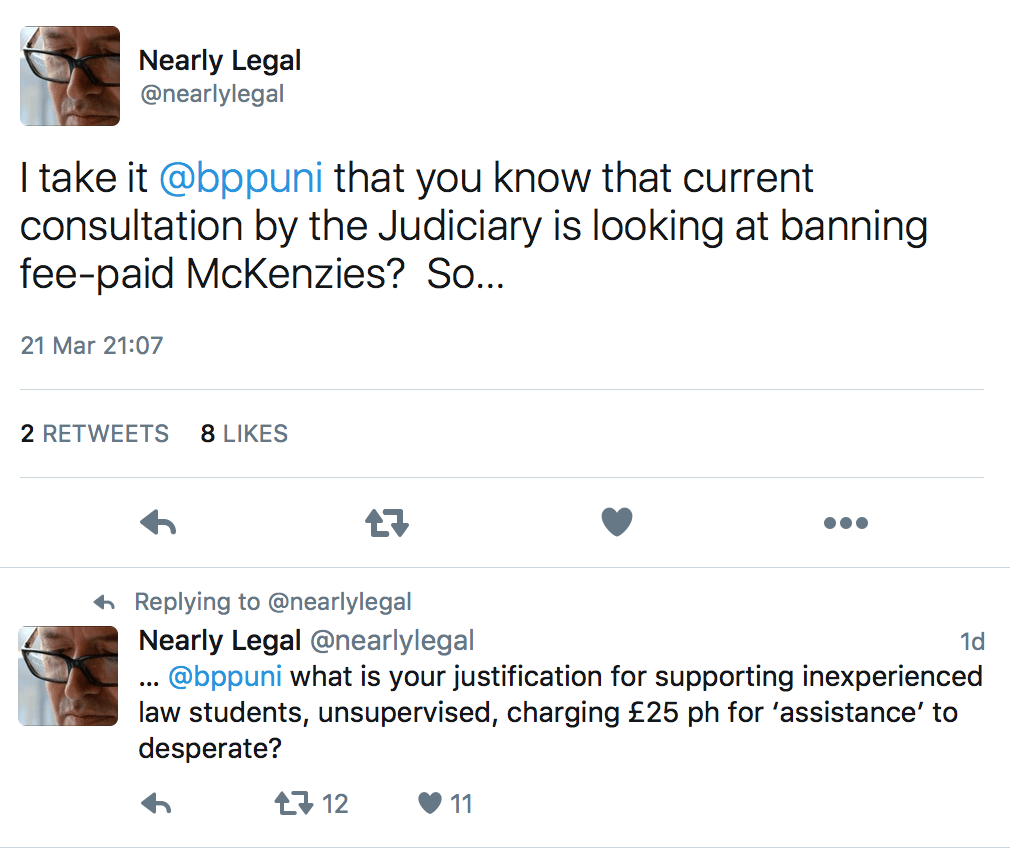
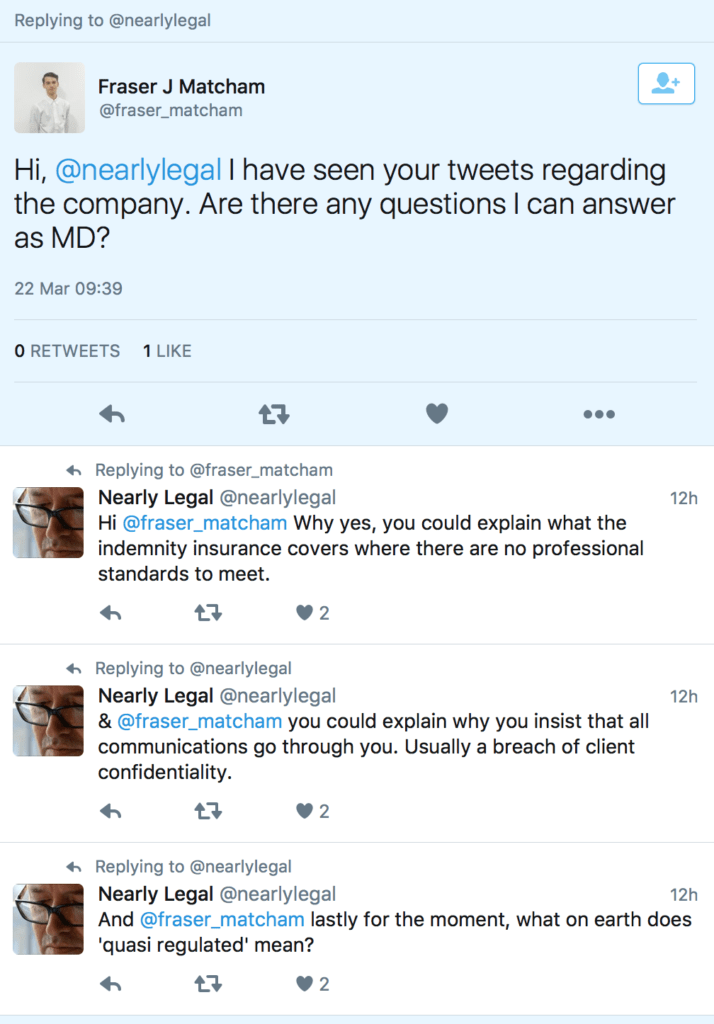
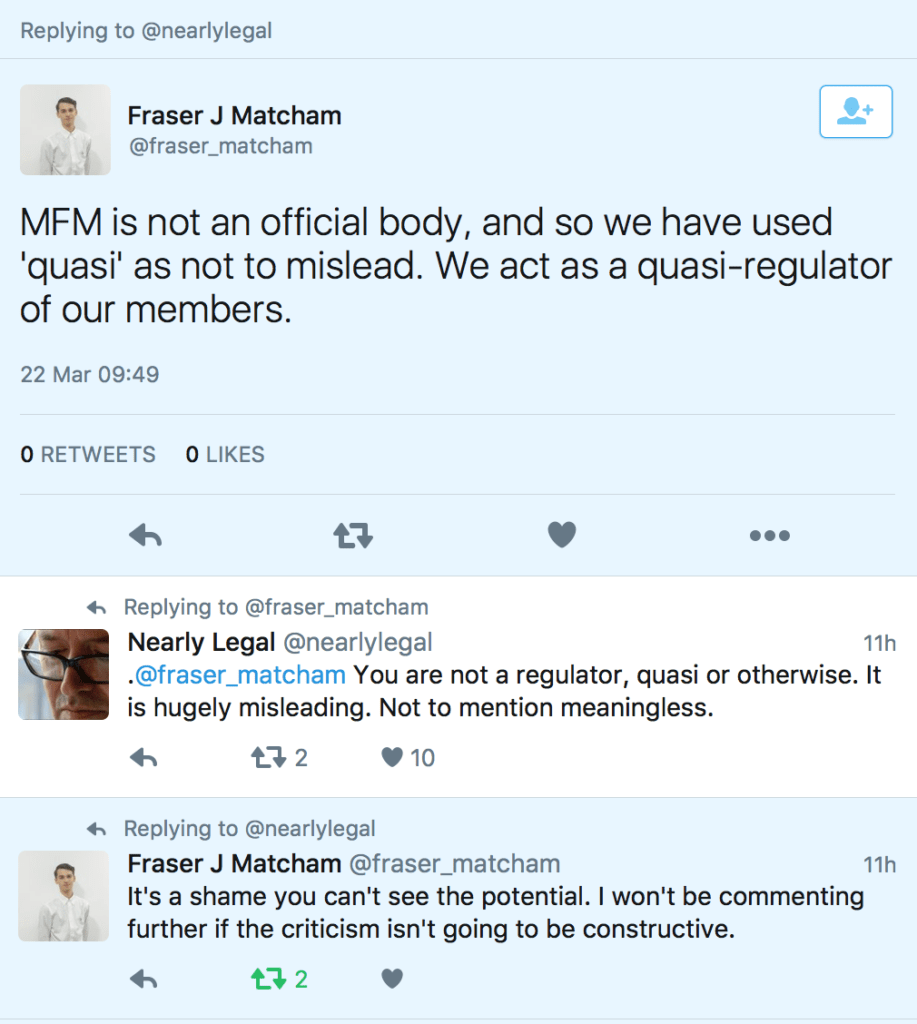
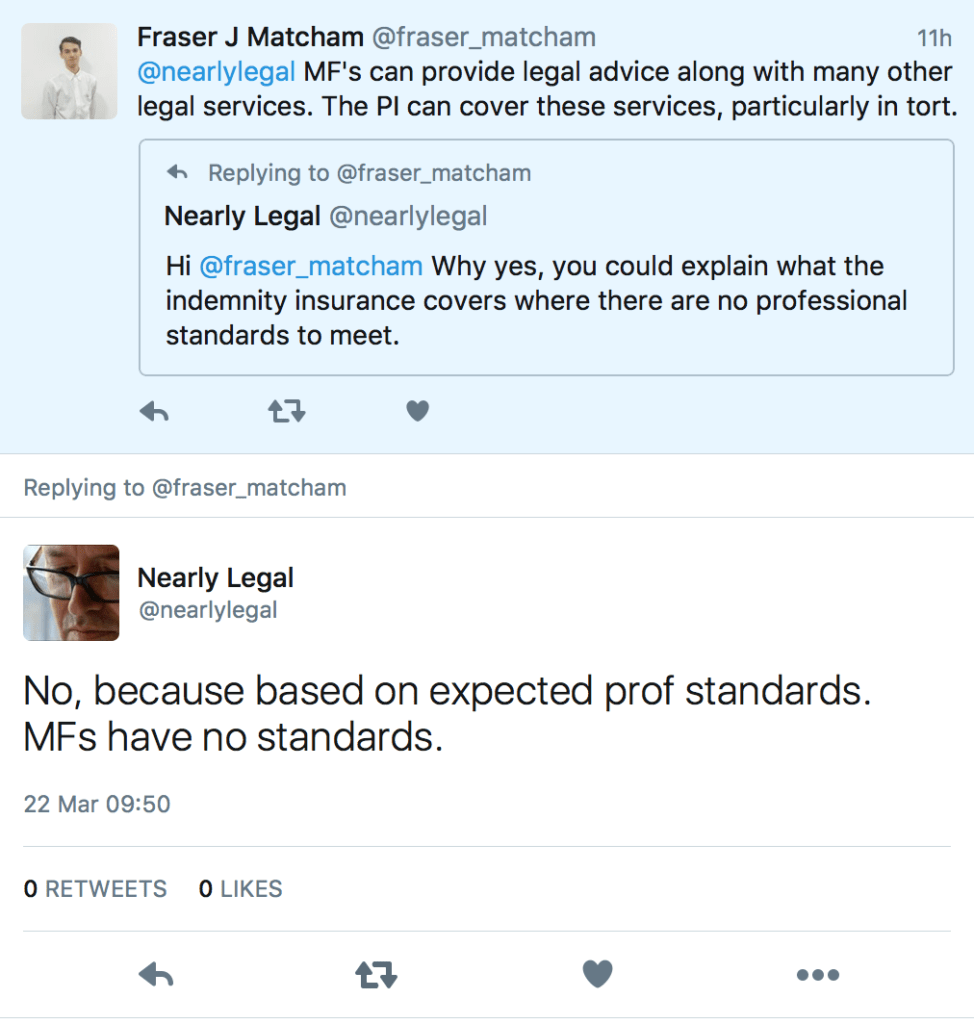
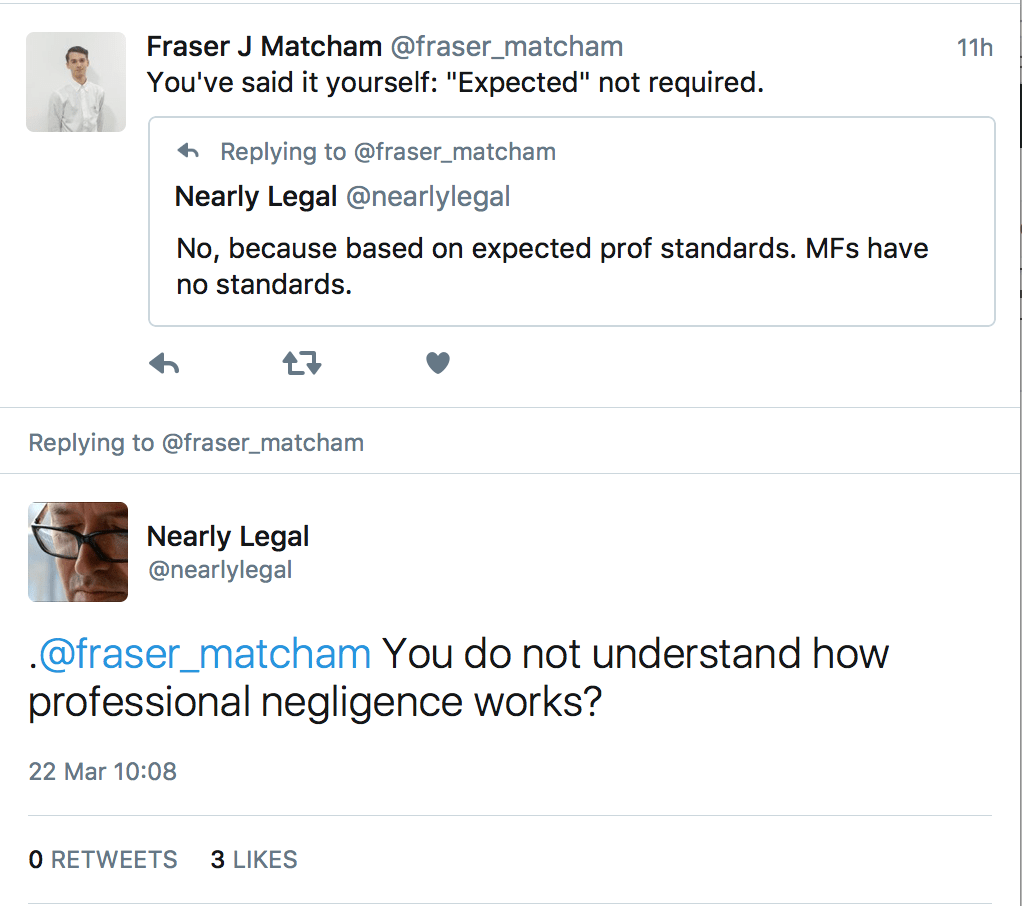
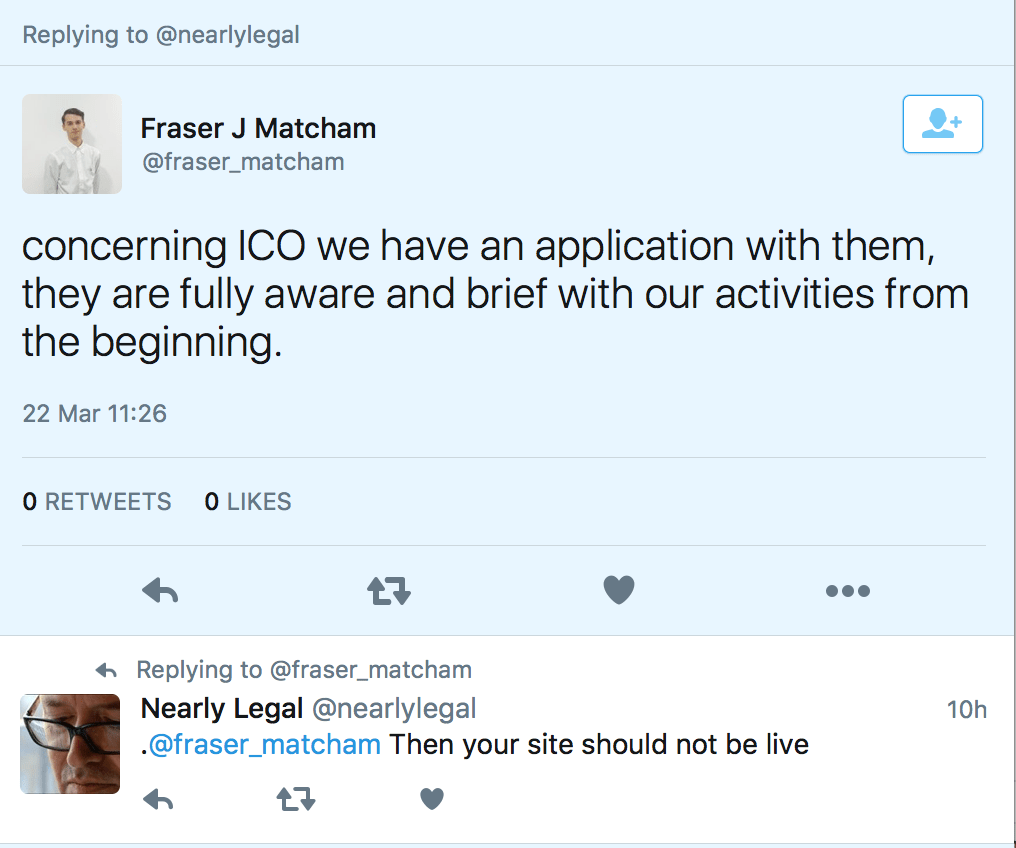
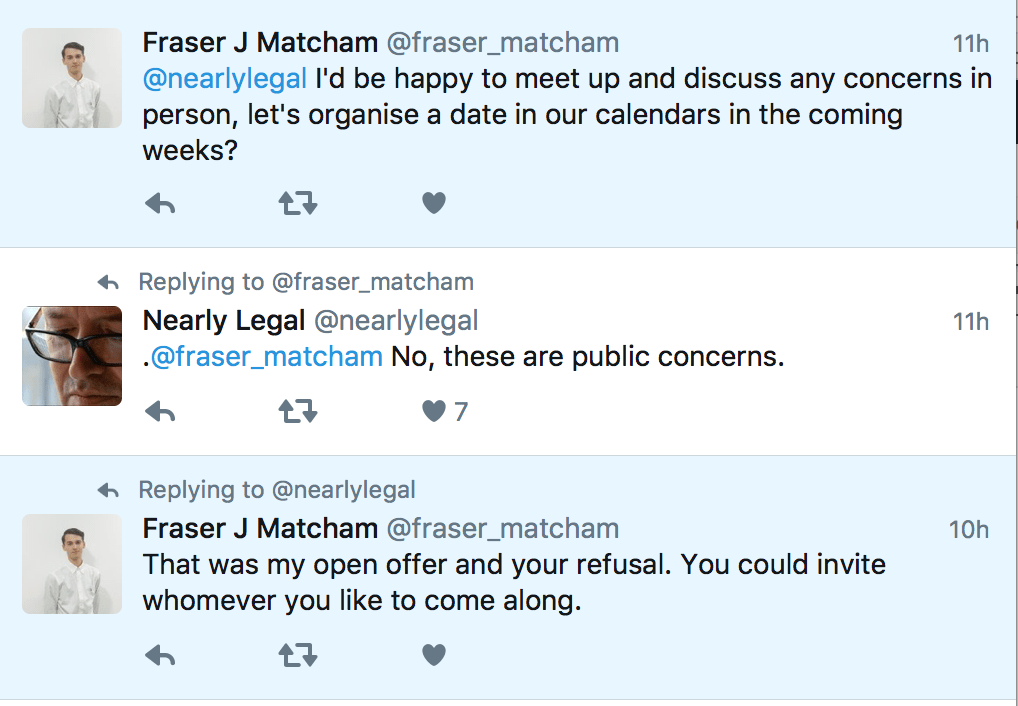
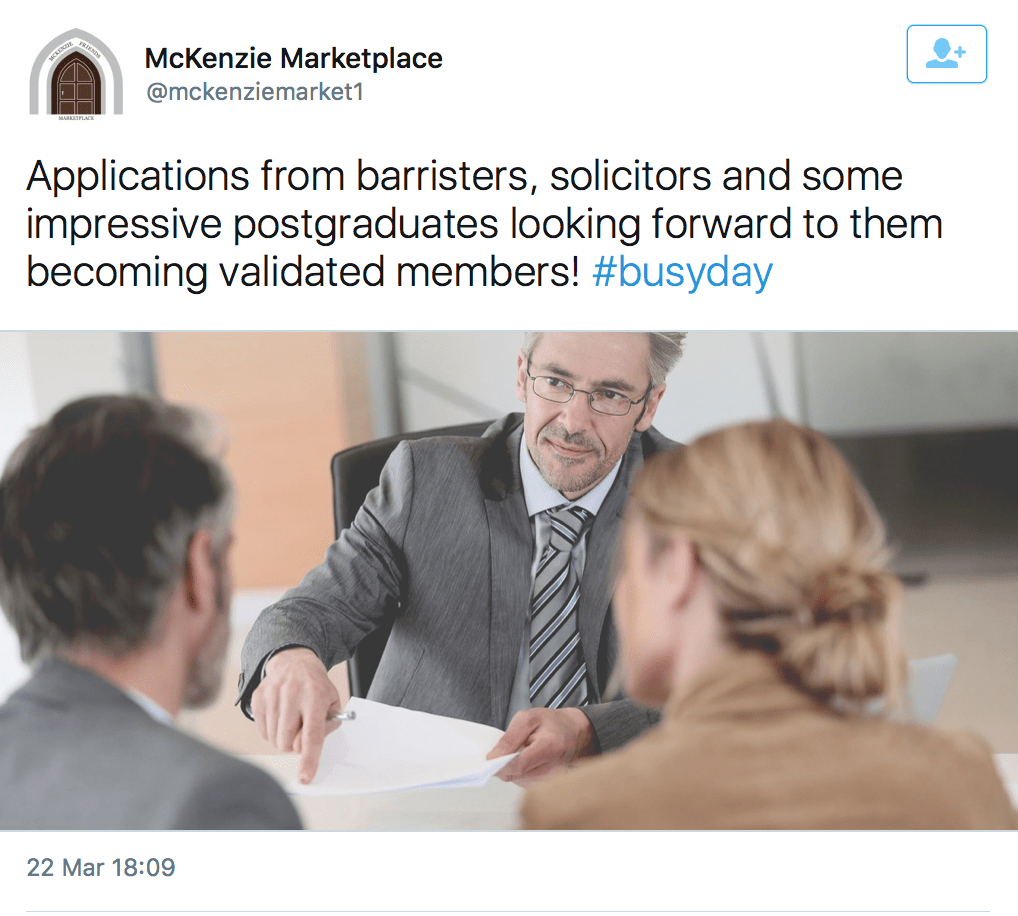
I’m unsure if Mr. Matcham understands the concept of professional indemnity insurance.
It’s us “mundane” solicitors that will be picking up the pieces following the foreseeable negligence.
If this were genuinely for “experience” then I am completely baffled that these pre-qualified law students are charging vulnerable people a fee – especially those in receipt of a low income (I imagine most if they are attending upon a student centre).
How do we know that in complex cases they are not simply retaining the cases for the profit and failing to point the client in the direction of a legal aid solicitor or other solicitor if appropriate.
Those poor unsuspecting clients…
Good post. I’ve come up against students training to be barristers, operating under supervision as part of a county court free advice service, and even they can be `hard work’, in the sense that their lack of experience sometimes means they can’t foresee likely outcomes, so reject decent offers, drive for `perfect’ outcomes for their `clients’, and then watch those `clients’ go down (needlessly) in flames. So god knows what unsupervised students are like! Will be interested to see how BPP and West. Uni react…
This is an interesting issue. I share quite a few concerns, which I hope Fraser and BPP (and perhaps Westminster – I’m not clear if they support this or not?) will discuss openly: what does quasi-regulation actually mean; are students supervised; what is the value of unsupervised experience for students (we should acknowledge – unless the world has changed dramatically from when I was a trainee -that sometimes training contracts take this form, even if we hope this is for a small minority of cases); should they be charging; is the attempt to set rates (I am not sure if these are upper rates or fixed hourly rates) to my mind, but this is a value judgment – highly problematic; will the benefits to litigants (I think there might be some, which we should acknowledge) outweigh the risks (I think they might be some of those too – and charging and holding client money make these significantly more acute). And there is the broader point – related to these things- about selling/mis-selling into this market, which you have been very vigorous in exposing elsewhere, and I think is very important. One thing I think BPP should do, if they are supporting this, is insist on, or conduct, some testing of what the consumers of these legal services think they are buying. Actually, they could get students unconnected with the scheme to do some of the data collection. That might really (or also) be valuable experience.
I am wondering though, and here I am looking to you and your readers to educate me, about the PII/professional negligence point. Isn’t the point that the law of negligence will apply to McKFriends? And whether they can get insurance for that? Whether we call it professional negligence might be a bit of a red herring, unless you are arguing that PII cannot cover them (this is more likely to depend on the terms of the insurance than whether you, or I regard themselves as professionals, I think).
FWIW, my understanding – and this is the point I would also welcome being corrected on – was that the Bolam/Bolitho tests of professional negligence apply to anyone professing some skill or competence – and that this might very well apply to McKenzie Friends – in that sense we might realistically suggest they are subject to the law of professional negligence. Working out quite what the standards of McKenzie friends might be would be an interesting question, but I think the court have done this in other areas, and we do not know what those standards are (I could hazard some guesses about the easy bits: the interesting question is if they stray towards giving legal and tactical advice) – but that would not mean they are not subject to or capable of getting cover for ‘professional’ negligence (I don’t think, but again I confess my ignorance).
Thanks Richard – all good and interesting thoughts.
On negligence, I struggle with the concept of the standard expected of a reasonably competent equivalent person. What is, or could possibly be, the standard of a reasonably competent McKenzie?
What the insurance would cover is so far a mystery. There is no information given on the site, either as to cover or to cost. But my suspicion is cover would either be very limited, or the insurer is satisfied that a claim in negligence would be almost impossible to bring, because otherwise, one would expect the premium to be huge.
Giles – I take your point re the difficulties of a negligence claim, but I wonder whether the court would hold them to the standard of skill that they professed to have? So, in other words, would the courts look at the marketing materials and see what standards the litigants could expect?
With professional negligence, there is always the possibility of a contract claim too for breach of SGSA 1982, for a failure to take reasonable care. It is unclear who would be a party to the contract in this case, but I expect it would be McKenzie Marketplace and the client. Maybe this is what the indemnity insurance is meant to cover?
Both the existence and form of ‘marketing materials’ and any contract through the MM site are opaque. I suppose any listing my a McKenzie on the site would count. But working out what kind of expertise was professed and the suitable standard for it from a few lines of bumpf would be a nightmare.
The nature of any contract and who would be a party is unknown – but going by the professed operation of the site, I would suspect it would be highly generic.
This all looks pretty mercenary and ill thought out and in shocking contrast to what is done in Bristol and here in Manchester. Avon and Bristol Law Centre’s LASP system provides supervised students to represent Appellants in First Tier Tribunal appeals against ESA refusals. That system has been extraordinarily successful in Bristol and students are queuing up to be part of it -partly so that they can help the Appellants but mainly to gain relevant experience and skills (statement taking, client handling, conferencing, legal research and advocacy) which they can rightly be proud to put on their CV. The students are keen despite not being paid for this. In Manchester, the LASP scheme is planned/set up to run from the Greater Manchester Law Centre and the local Universities are either involved or operating similar schemes. The idea that Appellants should be charged has never crossed anyone’s mind and the structure of the system has been very carefully thought through – including supervision and insurance arrangements.
I appreciate the LASP covers tribunal work in a limited sphere of law so in that respect, along with many others, it differs from MM but restricting the scope of LASP was deliberate as doing this recognises the limitations of the student participants and the paramount importance of not damaging someone’s life by the students taking on work that they are not competent to do.
It looks like the law needs charging to make it a criminal offence for a “McKenzie Friend” to charge directly or indirectly anyone that is taking part in a court case. After all friends don’t charge for help each other……
There is a current consultation on banning fee charging McKenzies from court proceedings.
How should people like housing officers that may be trained and qualified in housing law be dealt with, as they often know more then more people with a full legal qualification?
For appearance in court, see here
https://nearlylegal.co.uk/2017/01/solicitors-agents-yet-no-rights-audience/
and here
https://nearlylegal.co.uk/2016/09/solicitors-agents-rights-audience/
and here
https://nearlylegal.co.uk/2010/09/cant-hear-you/
for discussion of such things – have a look in the comments in particular.
But for housing officers advising – that is in the course of their employment. They are not doing McKenzie Friend style work.
They were consulting on banning fee charging McKenzies altogether. Not sure where I stand to be honest. On the one hand the thought of anyone being allowed to charge for unqualified legal assistance is feels utterly wrong but on the other hand the voluntary sector can’t plug the legal aid funding gap completely.
This fence is very comfy…
Giles, Yes that’s the question. The courts would have to work it out, I suppose, if I am right. Seems to me the exclusions on the insurance would then be critical: if you litigate; if you advocate; if you provide legal advice might all be exclusions which would fit with the kind of role an insurer might argue a McK friend is supposed to have – and if the McK friend strayed beyond that role then the client is not covered. Risk of suit might be quite low, I’d guess for the reasons in these comments, maybe they don’t bother with these exclusions.
That could well be the case, and the exclusions would make insurance pretty much pointless from the point of view of the client. Mr Matcham claimed to me that the insurance would cover legal advice by student McKenzies. I find that very hard to believe.
I am visiting from a different profession and can only imagine the furore if our undergraduates began charging for advice.
I am all in favour of supporting student creativity and entrepreneurship but very surprised to see law schools failing to protect their students from youthful naïveté.
DOI: Qualified as a doctor 7 years ago but won’t be working independently (i.e. without supervision/support) for at least another 6. A huge fan of professional humility.
My limited encounters with “paid” McKenzie friends at court is that they appear to be offering legal advice and are tempted into advocacy for their client. My last encounter was at Romford County Court when I encountered a “roving” McKenzie friend offering a “duty” service to private landlords in possession cases – it was unclear whether at the time this was with the court’s approval, the judge was forced to rein them in.
Given the high level of regulatory oversight on solicitors, barristers, legal executives and others providing any legal services and the wide range of pro bono units operated by the Bar, FRU and within universities and city solicitors this unregulated and uninsured scheme appears both dangerous, illegal and potentially very damaging to its users, the students and universities involved given the apparent lack of supervision and lack of professional indemnity insurance or proper complaint resolution mechanism or oversight by the Ombudsman or ICO.
https://www.lawgazette.co.uk/law/mckenzie-friend-entrepreneur-backtracks-on-student-portal/5060442.article
McKenzie friend entrepreneur backtracks on student portal
And http://www.legalfutures.co.uk/latest-news/mckenzie-friend-marketplace-ban-active-students-giving-legal-advice-wake-criticism with better info.